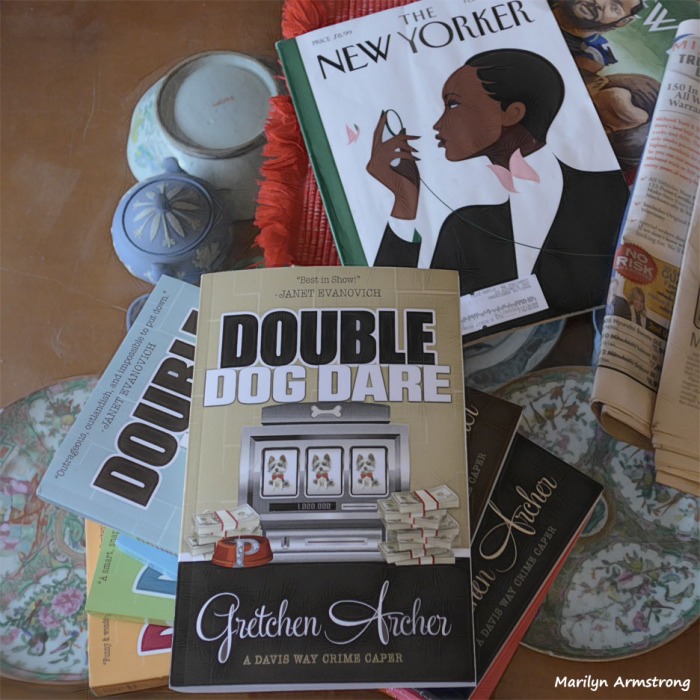I was out in Arizona talking to a Blue Corn Navajo lady who made jewelry. She had carefully given me her tribal affiliations and all I had to say was “Eastern European Jewish,” which lacked panache. I don’t seem to have much of an ability to show a lot of dash in casual conversation. Whatever talent I have, it’s more introverted.
Nonetheless, it was a good conversation. I casually said I was ” … waiting for my ship to come in and hoped it had a fortune on board for me.”
She asked me, seriously, whether I’d been out on the docks looking for my ship. Looking for my ship? She said “Yes, you have to watch for them. Otherwise, they can pass you by and you’ll never know you missed it.”
I’m sure I forget for years at a time to go look for my ship. It’s probably come and gone and I’ll never see it, even in the foggy distance.
It’s like looking for your writer’s voice. Recently, a lot of people have claimed to be looking for it. Or grumpily asserted they can’t figure out what it is and thus will never find it.
Your writer’s voice is you. Written. It is how you feel, what you mean. In words. Written down. That’s it. The beginning and the end of it. Anyone can find it, but you have to be looking for it. Most people are not looking. They are afraid to find it.
They think they are looking, though. They think your “writer’s voice” as a kind of style or form. Not true.
Your “voice” IS you. You are your voice. Once upon a time — more than 40 years ago –someone told me I wrote like I was afraid my mother would read it. I realized she was right. I was afraid my mother would read it. I didn’t want to hurt her feelings. I could not find my voice until after she died because I was afraid of what I might say.
The voice was there. I just wasn’t ready to use it where anyone might hear me.
If you are looking for your voice, stop reading books about it. A college course isn’t going to help you. Write how you speak and write what you say … the way you really say it. You should go back to your writing and read it aloud. It should sound like natural speech. More to the point, it should sound like your natural speech. If it doesn’t, rewrite it. If it sounds stilted and phony, it is.
Not everyone needs to find their voice. If what you want to do is write about what’s going on in the world, you only need to write well. Your voice need not come into it.
I want to add a bit here on style and form. Style and form (or format) are not your voice. They are formulas and relate to whatever type of writing you choose as your specialty. In other words, your audience or readership. If you are writing for children (for example), there is a rather rigid formula (with which I almost entirely disagree), especially if you want schools to use your work. Really great kid’s writers have ignored the formalities of the genre and written what they wanted to read when they were young.
I was planning to be the next great “author” although I was never sure what kind of great author. Everyone tells you to “write like yourself.” Except when you are young, you aren’t sure who “yourself” is. Maturity is terribly time-consuming. It can take most of your life.
Finding your voice means letting go of the writers you admired and not trying to sound like them. It means hanging loose. It doesn’t matter what you are writing about, whether it’s for kids, technicians, news-readers, or lovers of magic.
Many of us are unready to find our voice because we’re afraid our mother, father, pastor, brother, or husband will hear us. Worse, they might understand us and then, maybe, they won’t like it. Or us.
As for my ship? I’m not hanging out by the dock, watching for it. For all I know, it’s already on its way back to wherever it came from.
Categories: #Photography, #Writing, Arizona, Author, Marilyn Armstrong





How perfect! A brilliant description in fact. I love it! and I couldn’t agree more! There is such a difference between your “audience” and what you say. Thank you
LikeLike
I always say write what you know! Be real, be authentic! People will appreciate it and want to read you if you are real and authentic.
LikeLike
I used to have a better writer’s voice, but now I write carefully in fear that hubby or my back neighbor might read what I’ve written and get upset. Heck, I actually had to delete a post because my neighbor became incensed that I didn’t like her and then became a troll on my blog. I don’t need that, especially since I have to look at her through the fence when I go outside. Of course, I could always resurrect Not CM and continue to say whatever I damn well feel like …
LikeLike
I get it. It took me a LONG time to speak relatively freely and even now I’m cautious. None of us need a war with the neighbors or anyone else. We have plenty to fight already.
LikeLiked by 1 person
“My ship has sailed….”
LikeLike
I get it. It took me a LONG time to speak relatively freely and even now I’m cautious. None of us need a war with the neighbors or anyone else. We have plenty to fight already.
LikeLiked by 2 people
We need men to fight this virus. Men with guns. 7 men.
LikeLike
All full of great advice on life and writing.
LikeLiked by 1 person
We still all have to be careful — and it helps to know who is and isn’t reading our work. At first, it was easier because no one was reading me, but now, everyone reads me at least sometimes. Even trying to pretend someone is not who he is doesn’t necessarily work. They ALL pick up on it.
LikeLiked by 1 person
You’re so right.
LikeLike
The Navajo lady had a lot of good advice Marilyn.
Leslie
LikeLike
Yes, but I’m afraid I’m not going to hang out by the sea to watch for my ship. I might buy a lottery ticket, though. Someday.
LikeLiked by 1 person
😉
LikeLike
I enjoyed reading this…
LikeLike
Thanks. We all need to be cautious. We may think no one reads us, but it can be very surprising when you realize that a lot more people do than you ever thought possible.
LikeLike